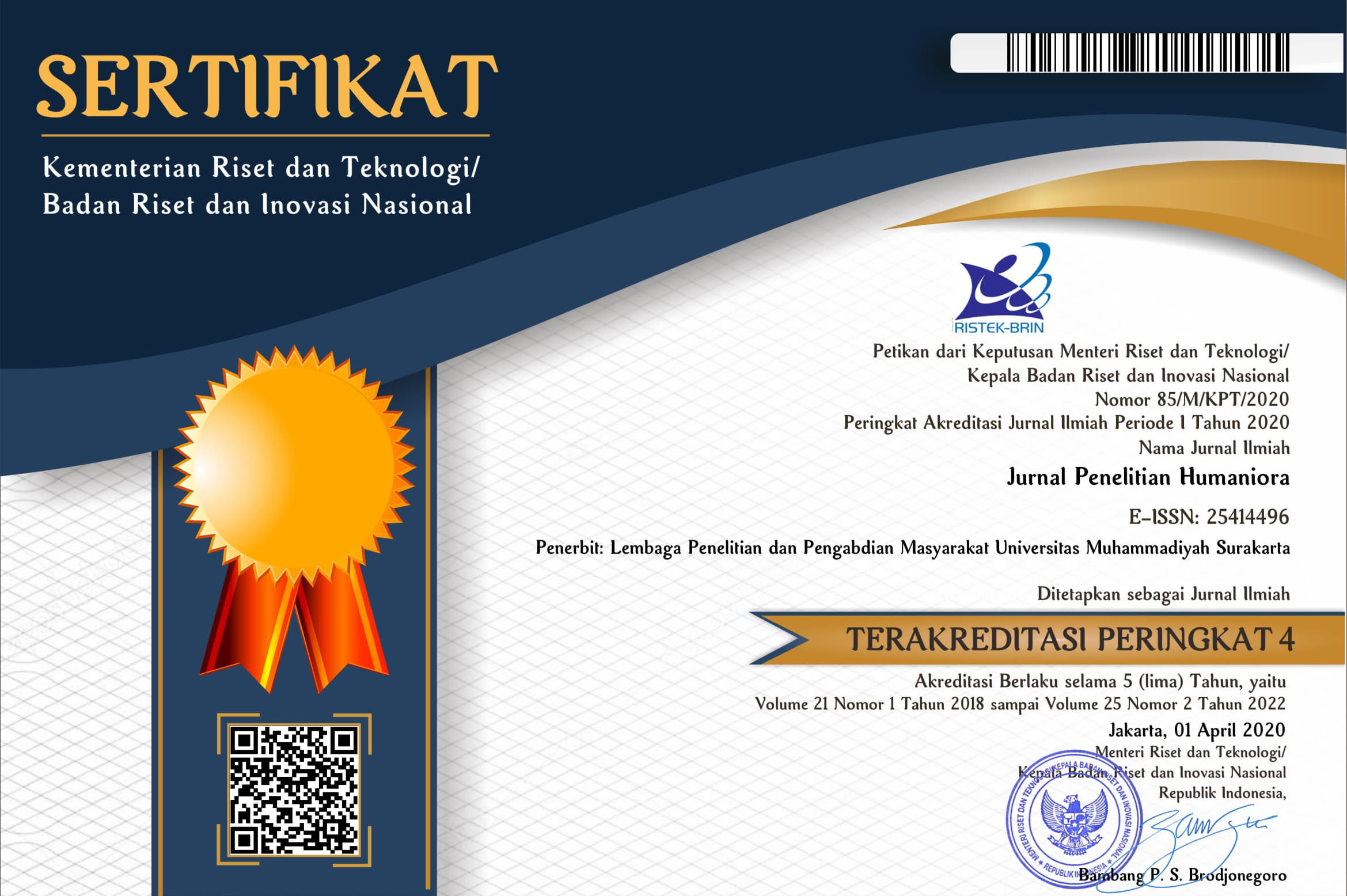AN EXPLORATION OF ANGER EXPRESSION IN INDONESIAN EFL LEARNING CONTEXT
Susiati Susiati(1*)(1)
(*) Corresponding Author
Abstract
well-known as calm people, the students mostly rise their intonation in expressing their anger feeling in English.
Full Text:
PDFReferences
Austin, J.l. 1962. How to Do Things with Words. Oxford: Oxford University Press.
Berman, L. 1999. Dignity in Tragedy: How Javanese Women Speak of Emotion. In G. Palmer and D. Occhi (eds.) Languages of Sentiment (pp. 65-106). Philadelphia: John Benjamins.
Celce-Murcia, M. and Loshtain, E. 2000. Discourse and Content in Language Teaching: A Guide for Language Teachers. Cambridge: Cambridge University Press.
Chierchia, G. and McConnell-Ginet, S. 2000. Meaning and Grammar -- An Introduction to Semantics, 2nd ed. Cambridge: MIT Press.
Chomsky, N. 2006. Language and Mind. Cambridge: Cambridge University Press.
Cosgrave, B. 2007. Understanding Anger. Maynooth: The Furrow. Available from: http://www.jstor.org/stable/27665595 [Accessed: April 11th, 2015].
Cozier, N. and Kleinsasser, R.C. 2006. Home Country Teachers’ Advice to Non-Home Country Teachers. London: SAGE Publications. Available from: http://RELC.sagepub.
com [Accessed: April 13th, 2015].
Criticism. 2004. Available from: http://www.criticism.com/linguistics/semantics-vs-pragmatics.php [Accessed April 18th, 2015].
Dippold, D. 2008. Reframing Ones Experience: Face, Identity, and Roles in L2 Argumentative discourse. In M. Putz & J. A. Neff-van (Eds.). Developing Contrastive Pragmatics. Interlanguage and Cross-cultural perspectives (pp. 131-154). Berlin: Mouton de Gruyter.
Gee, J.P. 2005. An Introduction to Discourse Analysis: Theory and Method. London: Routledge.
Green, G.M. 1989. Pragmatics and Natural Language Understanding. New Jersey: Lawrence Erlbaum Associates.
Holliday, A. 1999. Small Cultures, Applied Linguistics, 20(2), 237-264.
Konishi, C. and Hymel, S. 2014. An Attachment Perspective on Anger among Adolescents. Detroit: Wayne State University Press. Available from :http:// www.jstor.org/stable/10.13110/merrpalmquar1982.60.1.0053 [Accessed: April 11 2015].
Learnex. 2014. Available from: http://learnex.in/vocabulary-to-express-anger-in-english/ [Accessed April 17
th, 2015].
Leech, G.N. 1983. The Principles of Pragmatics. London: Longman.
Levinson, S.C. 1983. Pragmatics. Cambridge: Cambridge University Press.
Lyons, J. 1999. Semantics. Cambridge: Cambridge University Press.
Marjayanti, D. 2010. Expression of Anger Uttered by Characters in Drama Manuscripts (Pragmatics Approach), MUP, 10(2), 18-27.
Matreyek, W. 2005. Communicating in English: Examples and Models. In Q. Masykuroh & N. Hidayat (eds.) Situational Communications in English. Surakarta: Muhammadiyah
University Press.
Mirzaei, A., Roohani, A. & Esmaeili, M. 2012. Exploring Pragmalinguistic and Sociopragmatic Variability in Speech Act Production of L2 Learners and Native Speakers, JTLS, 4(3), 79102.
Olsen, S.E. 1988. Psychopathology, Interaction, and Pragmatic Linguistics. In J.L. Mey (ed.) Pragmalinguistics: Theory and Practice. The Hague: Mouton Publishers.
Riley, P. 1979. Towards a Contrastive Pragmalinguistics, PsiCl, 10, 57-79.
Roach, P. 1987. English Phonetics and Phonology. Cambridge: Cambridge University Press.
Savic, M. 2014. Politeness through the Prism of Requests, Apologies and Refusals (a Case of Serbian EFL Learners). Newcastle: Cambridge Scholars Publishing.
Steiner, E. H., & Veltman, R. (eds.) 1988. Pragmatics, Discourse and Text: Some systemically Inspired Approaches. London: Pinten.
Taguchi, N. (Ed.). 2009. Pragmatic competence. New York, Berlin: Mouton de Gruyter.
Thomas, J. 1995. Meaning in Interaction: an Introduction to Pragmatics. London: Longman.
Trosborg, A. (Ed.). 2010. Pragmatics across languages and cultures. Berlin: Mouton de Gruyter.
Van Dijk, T.A. 1976. Pragmatics, Presuppositions and Context Grammars. In J. Schmidt (ed.) Pragmatics 2. Munchen: Wilhelm Fink Verlag.
Wolff and Peodjosoedarmo. 1982. Anthropological Linguistics. Bloomington: Indiana University Press.
Article Metrics
Abstract view(s): 714 time(s)PDF: 656 time(s)
Refbacks
- There are currently no refbacks.











